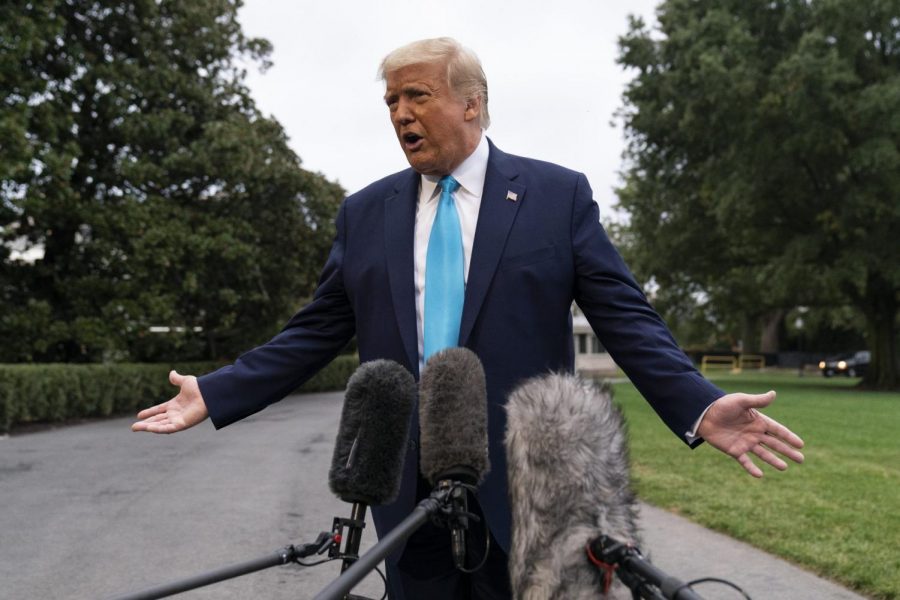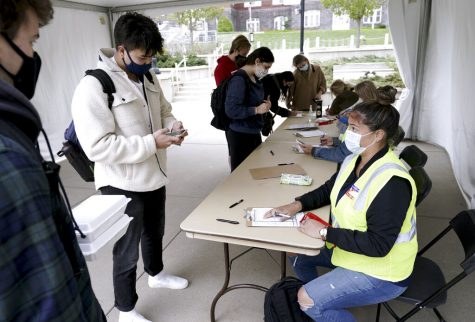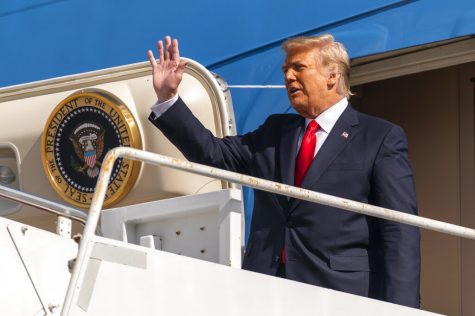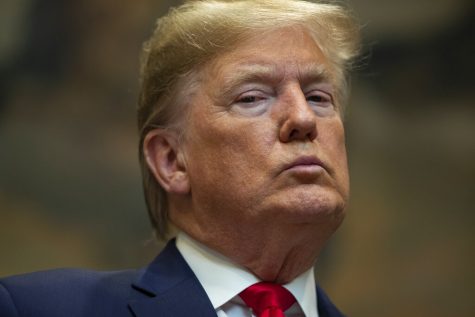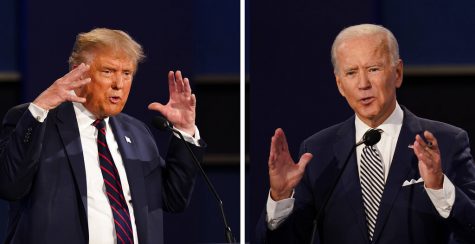Analysis: How Trump’s refusal to concede affects American society
President Donald Trump speaks with reporters as he walks to Marine One on the South Lawn of the White House, Saturday, Sept. 26, 2020, in Washington, before departing for a campaign rally in Middletown, Pa.
The morning after Election Night in 2016, once the Associated Press declared that Donald Trump won the presidency, former Secretary of State Hillary Clinton made a phone call to election victor Donald Trump to concede, urged by then-president Barack Obama. Less than 48 hours later, Obama met with Trump — his successor — in the White House to help him with the transition to the presidency.
Four years later, nothing like that has happened. For more than weeks after mainstream news outlets declared Joe Biden the winner of the election, Trump has refused to concede. Even though he seemingly acknowledged for the first time on Twitter that Joe Biden won, tweeting that “he won because the Election was Rigged,” he later said he was not conceding the result on Nov. 3.
He has filed several lawsuits in swing states, including Pennsylvania, Michigan, Arizona, Georgia and Nevada. However, most of the lawsuits have failed due to lack of evidence backing up his claims of fraud and illegal ballots.
Trump has repeatedly claimed that illegal votes resulted in his defeat. The Associated Press fact-checked the statements he made, which were mostly baseless, or with no presented evidence.
Even though the statements were mostly unverified, Richard Craig Sautter, U.S. Presidential politics expert and DePaul professor, said Trump is fully within his rights to lodge lawsuits or call for recounts. Most states will not certify their votes until the end of November, and the Electoral College will not vote until December 14.
“It appears that the President is playing to his base, 73 million voters — the second most in U.S. history, who are unhappy about the outcome,” Sautter said. “And I am sure he believes he was cheated out of victory by an unwieldy vote by mail process, which incidentally needs to have some reforms, such as a uniform date of when ballots must be returned.”
Sautter said cities like Philadelphia, Chicago and Milwaukee have had instances of voter fraud. As a result, Trump no doubt suspects more widespread voter fraud and has expressed his frustration.
“The 1960 presidential election, for example, was decided by less than 100,00 votes, and Chicago Mayor Daley was charged in the press with vote fraud, including allowing dead voters to vote,” Sautter said.“But that does not mean he is going to try to orchestrate some kind of coup.”
Sautter pointed out that Trump is not the first president who was unwilling to cooperate after a loss. In fact, John Adams, the second President of the United States (1797-1801) did not leave Washington D.C. until the morning before his opponent, Thomas Jefferson, was inaugurated. Democrat Al Gore, although he was not the incumbent, did not concede until early December after the 2000 election.
David Priess, chief operating officer at the Lawfare Institute and former CIA intelligence officer, said the concession does not “legally” matter because no matter what, the duly elected president will be inaugurated on January 20, whether the outgoing president acknowledges the defeat or not. However, conceding defeat has practical and logistical benefits to help ensure a smooth transition of power to help establish the new president, as well as easing tension among supporters of the defeated president.
“It may seem like a long time, but when you’re trying to get the full mechanics of the executive branch turned over to a new team, getting security clearances passed, getting people in place, getting up to speed on all the policies and plans in progress, that takes a long time,” Priess said on PBS NewsHour.
A concession by Trump would also help alleviate the tensions that arose during the campaign. Priess said there have been many negative campaigns in U.S. history that saw supporters of losing candidates resort to rioting as a result of their discontent.
Priess pointed out the losing candidate should publicly accept the results of their defeat and support the new president, so that this helps bring society back together after the election campaign has divided it.
Trump’s refusal of concession might also pose a threat to U.S. democracy, according to Wayne Steger, Presidential election expert and political science professor at DePaul.
The main threat to democracy is that it expands and speeds up the degradation of norms that are necessary for the functioning of representative democracies, he said.
“Specifically, democratic political systems require a loyal opposition, that concede elections when they lose and then function as the opposition party until the next election when they have a chance to contest again,” Steger said.
All governments require legitimacy in order to function.
Steger said that Trump and his cooperating Republicans, along with right-wing media, are convincing most Republicans that the Biden election is illegitimate. This also inhibits cooperation and compromise, which are necessary for the functioning of the political system.
Steger added that this will in turn make the government less able to address the many problems and strains facing American society.
In Sautter’s opinion, Trump sees himself as a patriot and defender of American democracy against socialists and anarchists. He does not want to go down in history as a wrecker of American democracy.
“But President Trump has a history of stirring things up and then shifting gears and going in a different direction,” Sautter said.
Sautter fully expects that Trump will eventually participate in the peaceful transfer of power, though he might not be graceful.
“Perhaps he will not greet President-elect Biden at the White House and ride in a limousine to the Capitol to participate in his inauguration like other presidents,” Sautter said. “But he will not attempt to remain in power after noon of January 20.”
After the electors from the states vote for President-elect Biden, Trump will have no legal standing. He could be removed by Capitol police. The military brass are not fans of his and would not back him up in some kind of coup, Sautter said.
“President Trump has made some begrudging recent comments that make it clear he knows what is going on. He is not going to make it easy for his opponent (President-elect Biden) or his supporters,” Sautter said. “However, on January 20, we will have a new President.”


